MD4043 Leadership & Management: Reflective Essay on Residential Trip
VerifiedAdded on 2023/06/14
|13
|3651
|218
Essay
AI Summary
This essay presents a student's reflection on a residential period, focusing on experiences related to leadership and management. The student discusses overcoming a fear of heights during a team challenge, linking the experience to Carl Rogers' theory of self-actualization and personal development. The reflection details the initial nervousness, the support received from teammates, and the eventual success in completing the task. Furthermore, the essay reflects on past academic challenges and how they influenced personal growth. The student aims to apply the lessons learned to future endeavors, emphasizing the importance of confronting fears and anxieties to achieve professional goals. The essay uses Gibbs' reflective cycle to analyze the events, feelings, and evaluations, culminating in an action plan for continued self-improvement. This document is available on Desklib, a platform offering a wide range of study resources including past papers and solved assignments to support students.
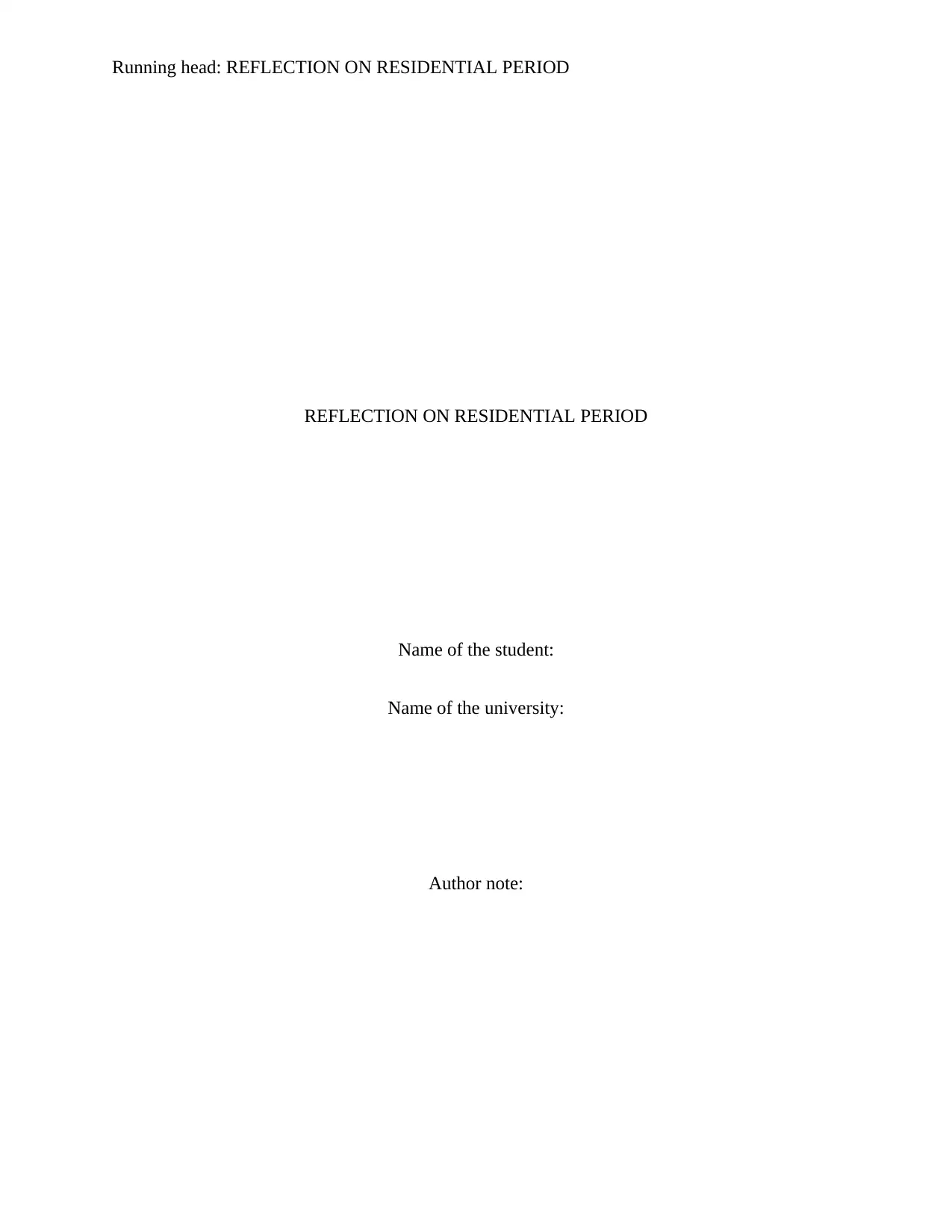
Running head: REFLECTION ON RESIDENTIAL PERIOD
REFLECTION ON RESIDENTIAL PERIOD
Name of the student:
Name of the university:
Author note:
REFLECTION ON RESIDENTIAL PERIOD
Name of the student:
Name of the university:
Author note:
Paraphrase This Document
Need a fresh take? Get an instant paraphrase of this document with our AI Paraphraser
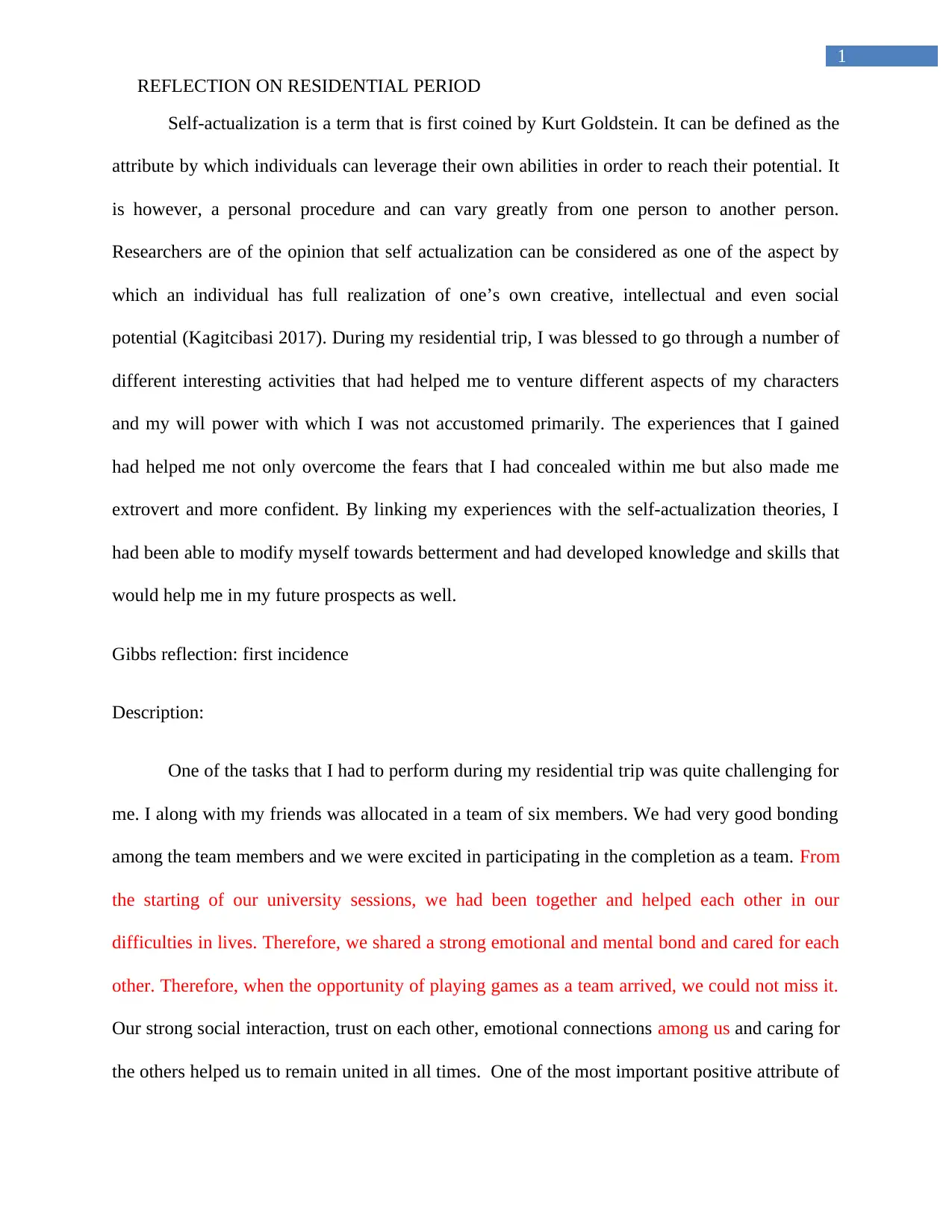
1
REFLECTION ON RESIDENTIAL PERIOD
Self-actualization is a term that is first coined by Kurt Goldstein. It can be defined as the
attribute by which individuals can leverage their own abilities in order to reach their potential. It
is however, a personal procedure and can vary greatly from one person to another person.
Researchers are of the opinion that self actualization can be considered as one of the aspect by
which an individual has full realization of one’s own creative, intellectual and even social
potential (Kagitcibasi 2017). During my residential trip, I was blessed to go through a number of
different interesting activities that had helped me to venture different aspects of my characters
and my will power with which I was not accustomed primarily. The experiences that I gained
had helped me not only overcome the fears that I had concealed within me but also made me
extrovert and more confident. By linking my experiences with the self-actualization theories, I
had been able to modify myself towards betterment and had developed knowledge and skills that
would help me in my future prospects as well.
Gibbs reflection: first incidence
Description:
One of the tasks that I had to perform during my residential trip was quite challenging for
me. I along with my friends was allocated in a team of six members. We had very good bonding
among the team members and we were excited in participating in the completion as a team. From
the starting of our university sessions, we had been together and helped each other in our
difficulties in lives. Therefore, we shared a strong emotional and mental bond and cared for each
other. Therefore, when the opportunity of playing games as a team arrived, we could not miss it.
Our strong social interaction, trust on each other, emotional connections among us and caring for
the others helped us to remain united in all times. One of the most important positive attribute of
REFLECTION ON RESIDENTIAL PERIOD
Self-actualization is a term that is first coined by Kurt Goldstein. It can be defined as the
attribute by which individuals can leverage their own abilities in order to reach their potential. It
is however, a personal procedure and can vary greatly from one person to another person.
Researchers are of the opinion that self actualization can be considered as one of the aspect by
which an individual has full realization of one’s own creative, intellectual and even social
potential (Kagitcibasi 2017). During my residential trip, I was blessed to go through a number of
different interesting activities that had helped me to venture different aspects of my characters
and my will power with which I was not accustomed primarily. The experiences that I gained
had helped me not only overcome the fears that I had concealed within me but also made me
extrovert and more confident. By linking my experiences with the self-actualization theories, I
had been able to modify myself towards betterment and had developed knowledge and skills that
would help me in my future prospects as well.
Gibbs reflection: first incidence
Description:
One of the tasks that I had to perform during my residential trip was quite challenging for
me. I along with my friends was allocated in a team of six members. We had very good bonding
among the team members and we were excited in participating in the completion as a team. From
the starting of our university sessions, we had been together and helped each other in our
difficulties in lives. Therefore, we shared a strong emotional and mental bond and cared for each
other. Therefore, when the opportunity of playing games as a team arrived, we could not miss it.
Our strong social interaction, trust on each other, emotional connections among us and caring for
the others helped us to remain united in all times. One of the most important positive attribute of
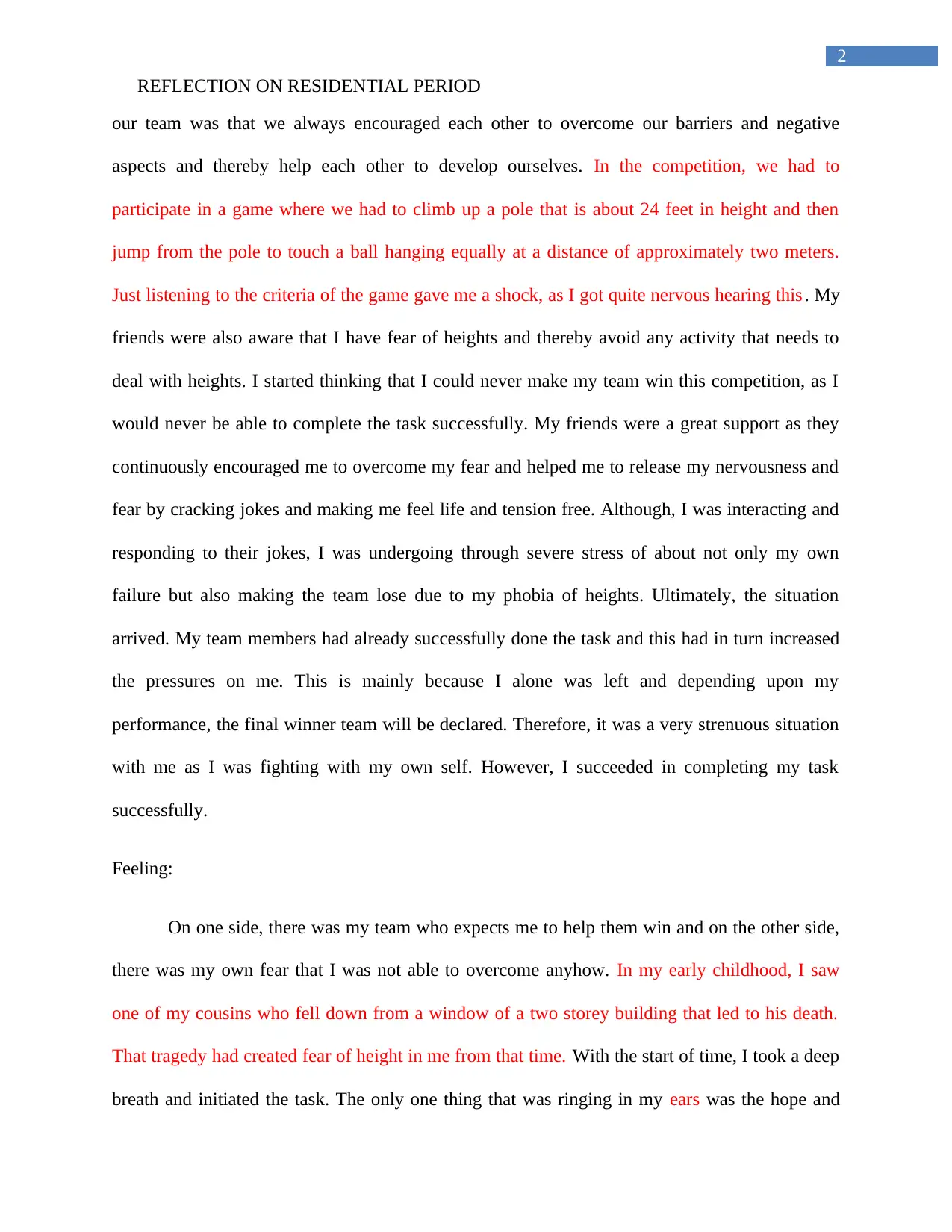
2
REFLECTION ON RESIDENTIAL PERIOD
our team was that we always encouraged each other to overcome our barriers and negative
aspects and thereby help each other to develop ourselves. In the competition, we had to
participate in a game where we had to climb up a pole that is about 24 feet in height and then
jump from the pole to touch a ball hanging equally at a distance of approximately two meters.
Just listening to the criteria of the game gave me a shock, as I got quite nervous hearing this . My
friends were also aware that I have fear of heights and thereby avoid any activity that needs to
deal with heights. I started thinking that I could never make my team win this competition, as I
would never be able to complete the task successfully. My friends were a great support as they
continuously encouraged me to overcome my fear and helped me to release my nervousness and
fear by cracking jokes and making me feel life and tension free. Although, I was interacting and
responding to their jokes, I was undergoing through severe stress of about not only my own
failure but also making the team lose due to my phobia of heights. Ultimately, the situation
arrived. My team members had already successfully done the task and this had in turn increased
the pressures on me. This is mainly because I alone was left and depending upon my
performance, the final winner team will be declared. Therefore, it was a very strenuous situation
with me as I was fighting with my own self. However, I succeeded in completing my task
successfully.
Feeling:
On one side, there was my team who expects me to help them win and on the other side,
there was my own fear that I was not able to overcome anyhow. In my early childhood, I saw
one of my cousins who fell down from a window of a two storey building that led to his death.
That tragedy had created fear of height in me from that time. With the start of time, I took a deep
breath and initiated the task. The only one thing that was ringing in my ears was the hope and
REFLECTION ON RESIDENTIAL PERIOD
our team was that we always encouraged each other to overcome our barriers and negative
aspects and thereby help each other to develop ourselves. In the competition, we had to
participate in a game where we had to climb up a pole that is about 24 feet in height and then
jump from the pole to touch a ball hanging equally at a distance of approximately two meters.
Just listening to the criteria of the game gave me a shock, as I got quite nervous hearing this . My
friends were also aware that I have fear of heights and thereby avoid any activity that needs to
deal with heights. I started thinking that I could never make my team win this competition, as I
would never be able to complete the task successfully. My friends were a great support as they
continuously encouraged me to overcome my fear and helped me to release my nervousness and
fear by cracking jokes and making me feel life and tension free. Although, I was interacting and
responding to their jokes, I was undergoing through severe stress of about not only my own
failure but also making the team lose due to my phobia of heights. Ultimately, the situation
arrived. My team members had already successfully done the task and this had in turn increased
the pressures on me. This is mainly because I alone was left and depending upon my
performance, the final winner team will be declared. Therefore, it was a very strenuous situation
with me as I was fighting with my own self. However, I succeeded in completing my task
successfully.
Feeling:
On one side, there was my team who expects me to help them win and on the other side,
there was my own fear that I was not able to overcome anyhow. In my early childhood, I saw
one of my cousins who fell down from a window of a two storey building that led to his death.
That tragedy had created fear of height in me from that time. With the start of time, I took a deep
breath and initiated the task. The only one thing that was ringing in my ears was the hope and
⊘ This is a preview!⊘
Do you want full access?
Subscribe today to unlock all pages.

Trusted by 1+ million students worldwide
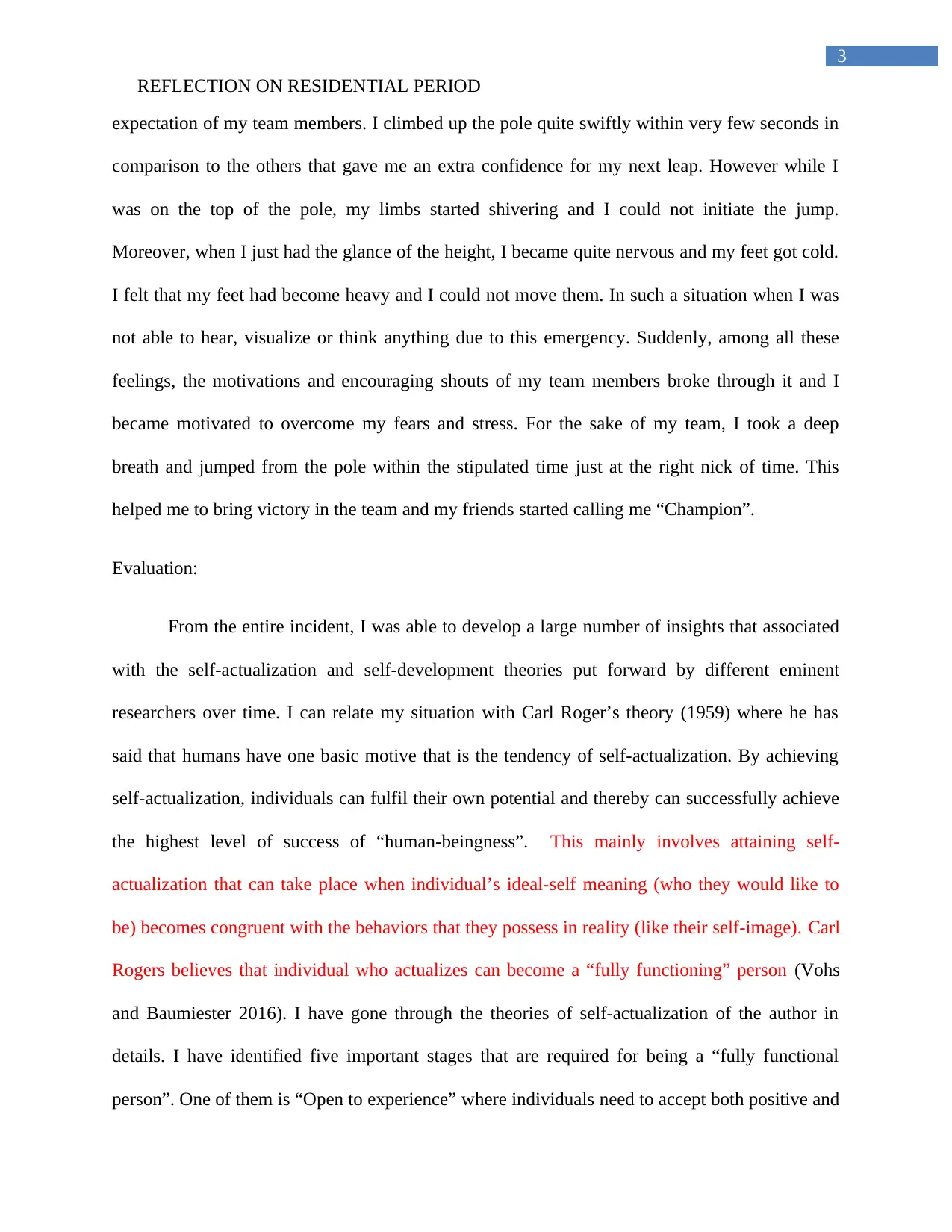
3
REFLECTION ON RESIDENTIAL PERIOD
expectation of my team members. I climbed up the pole quite swiftly within very few seconds in
comparison to the others that gave me an extra confidence for my next leap. However while I
was on the top of the pole, my limbs started shivering and I could not initiate the jump.
Moreover, when I just had the glance of the height, I became quite nervous and my feet got cold.
I felt that my feet had become heavy and I could not move them. In such a situation when I was
not able to hear, visualize or think anything due to this emergency. Suddenly, among all these
feelings, the motivations and encouraging shouts of my team members broke through it and I
became motivated to overcome my fears and stress. For the sake of my team, I took a deep
breath and jumped from the pole within the stipulated time just at the right nick of time. This
helped me to bring victory in the team and my friends started calling me “Champion”.
Evaluation:
From the entire incident, I was able to develop a large number of insights that associated
with the self-actualization and self-development theories put forward by different eminent
researchers over time. I can relate my situation with Carl Roger’s theory (1959) where he has
said that humans have one basic motive that is the tendency of self-actualization. By achieving
self-actualization, individuals can fulfil their own potential and thereby can successfully achieve
the highest level of success of “human-beingness”. This mainly involves attaining self-
actualization that can take place when individual’s ideal-self meaning (who they would like to
be) becomes congruent with the behaviors that they possess in reality (like their self-image). Carl
Rogers believes that individual who actualizes can become a “fully functioning” person (Vohs
and Baumiester 2016). I have gone through the theories of self-actualization of the author in
details. I have identified five important stages that are required for being a “fully functional
person”. One of them is “Open to experience” where individuals need to accept both positive and
REFLECTION ON RESIDENTIAL PERIOD
expectation of my team members. I climbed up the pole quite swiftly within very few seconds in
comparison to the others that gave me an extra confidence for my next leap. However while I
was on the top of the pole, my limbs started shivering and I could not initiate the jump.
Moreover, when I just had the glance of the height, I became quite nervous and my feet got cold.
I felt that my feet had become heavy and I could not move them. In such a situation when I was
not able to hear, visualize or think anything due to this emergency. Suddenly, among all these
feelings, the motivations and encouraging shouts of my team members broke through it and I
became motivated to overcome my fears and stress. For the sake of my team, I took a deep
breath and jumped from the pole within the stipulated time just at the right nick of time. This
helped me to bring victory in the team and my friends started calling me “Champion”.
Evaluation:
From the entire incident, I was able to develop a large number of insights that associated
with the self-actualization and self-development theories put forward by different eminent
researchers over time. I can relate my situation with Carl Roger’s theory (1959) where he has
said that humans have one basic motive that is the tendency of self-actualization. By achieving
self-actualization, individuals can fulfil their own potential and thereby can successfully achieve
the highest level of success of “human-beingness”. This mainly involves attaining self-
actualization that can take place when individual’s ideal-self meaning (who they would like to
be) becomes congruent with the behaviors that they possess in reality (like their self-image). Carl
Rogers believes that individual who actualizes can become a “fully functioning” person (Vohs
and Baumiester 2016). I have gone through the theories of self-actualization of the author in
details. I have identified five important stages that are required for being a “fully functional
person”. One of them is “Open to experience” where individuals need to accept both positive and
Paraphrase This Document
Need a fresh take? Get an instant paraphrase of this document with our AI Paraphraser
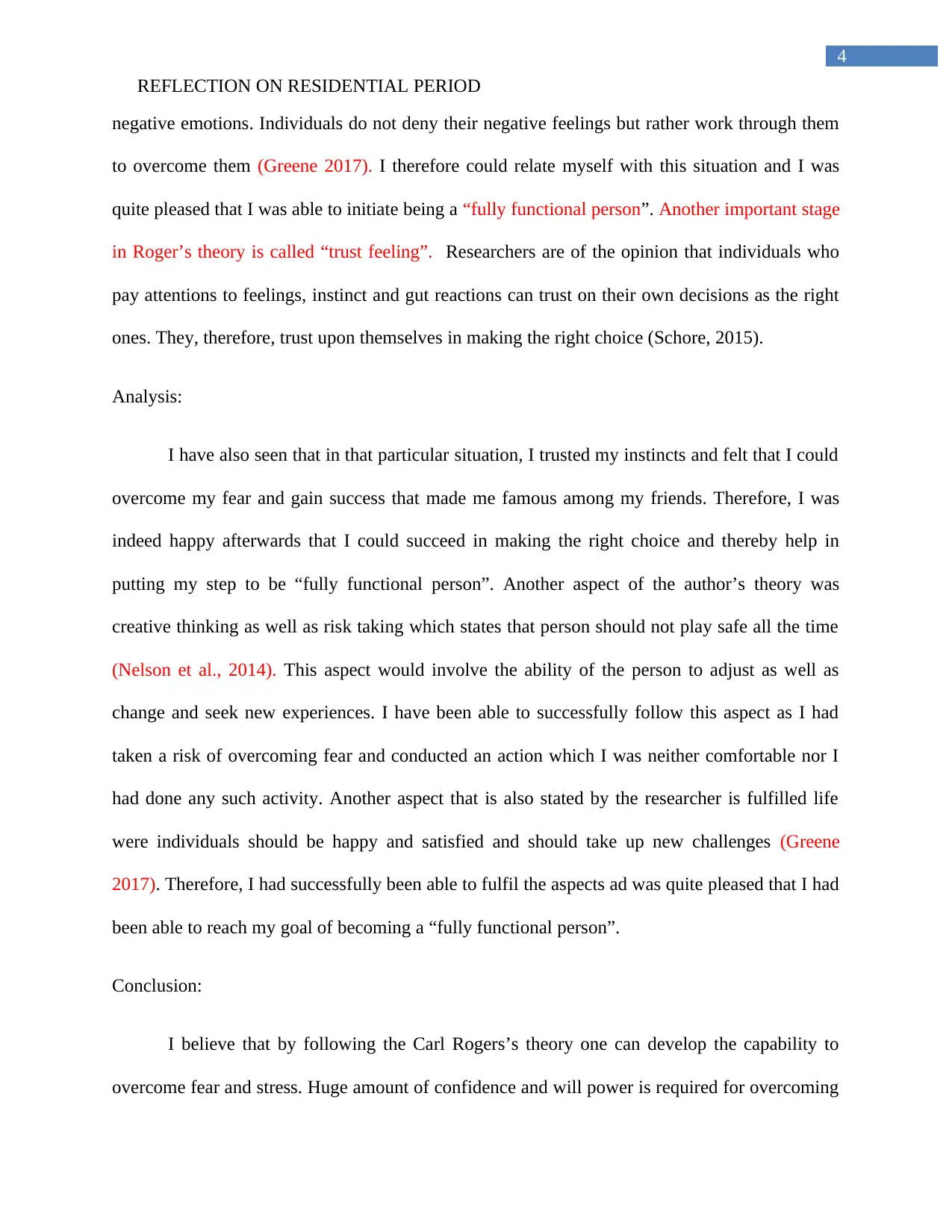
4
REFLECTION ON RESIDENTIAL PERIOD
negative emotions. Individuals do not deny their negative feelings but rather work through them
to overcome them (Greene 2017). I therefore could relate myself with this situation and I was
quite pleased that I was able to initiate being a “fully functional person”. Another important stage
in Roger’s theory is called “trust feeling”. Researchers are of the opinion that individuals who
pay attentions to feelings, instinct and gut reactions can trust on their own decisions as the right
ones. They, therefore, trust upon themselves in making the right choice (Schore, 2015).
Analysis:
I have also seen that in that particular situation, I trusted my instincts and felt that I could
overcome my fear and gain success that made me famous among my friends. Therefore, I was
indeed happy afterwards that I could succeed in making the right choice and thereby help in
putting my step to be “fully functional person”. Another aspect of the author’s theory was
creative thinking as well as risk taking which states that person should not play safe all the time
(Nelson et al., 2014). This aspect would involve the ability of the person to adjust as well as
change and seek new experiences. I have been able to successfully follow this aspect as I had
taken a risk of overcoming fear and conducted an action which I was neither comfortable nor I
had done any such activity. Another aspect that is also stated by the researcher is fulfilled life
were individuals should be happy and satisfied and should take up new challenges (Greene
2017). Therefore, I had successfully been able to fulfil the aspects ad was quite pleased that I had
been able to reach my goal of becoming a “fully functional person”.
Conclusion:
I believe that by following the Carl Rogers’s theory one can develop the capability to
overcome fear and stress. Huge amount of confidence and will power is required for overcoming
REFLECTION ON RESIDENTIAL PERIOD
negative emotions. Individuals do not deny their negative feelings but rather work through them
to overcome them (Greene 2017). I therefore could relate myself with this situation and I was
quite pleased that I was able to initiate being a “fully functional person”. Another important stage
in Roger’s theory is called “trust feeling”. Researchers are of the opinion that individuals who
pay attentions to feelings, instinct and gut reactions can trust on their own decisions as the right
ones. They, therefore, trust upon themselves in making the right choice (Schore, 2015).
Analysis:
I have also seen that in that particular situation, I trusted my instincts and felt that I could
overcome my fear and gain success that made me famous among my friends. Therefore, I was
indeed happy afterwards that I could succeed in making the right choice and thereby help in
putting my step to be “fully functional person”. Another aspect of the author’s theory was
creative thinking as well as risk taking which states that person should not play safe all the time
(Nelson et al., 2014). This aspect would involve the ability of the person to adjust as well as
change and seek new experiences. I have been able to successfully follow this aspect as I had
taken a risk of overcoming fear and conducted an action which I was neither comfortable nor I
had done any such activity. Another aspect that is also stated by the researcher is fulfilled life
were individuals should be happy and satisfied and should take up new challenges (Greene
2017). Therefore, I had successfully been able to fulfil the aspects ad was quite pleased that I had
been able to reach my goal of becoming a “fully functional person”.
Conclusion:
I believe that by following the Carl Rogers’s theory one can develop the capability to
overcome fear and stress. Huge amount of confidence and will power is required for overcoming
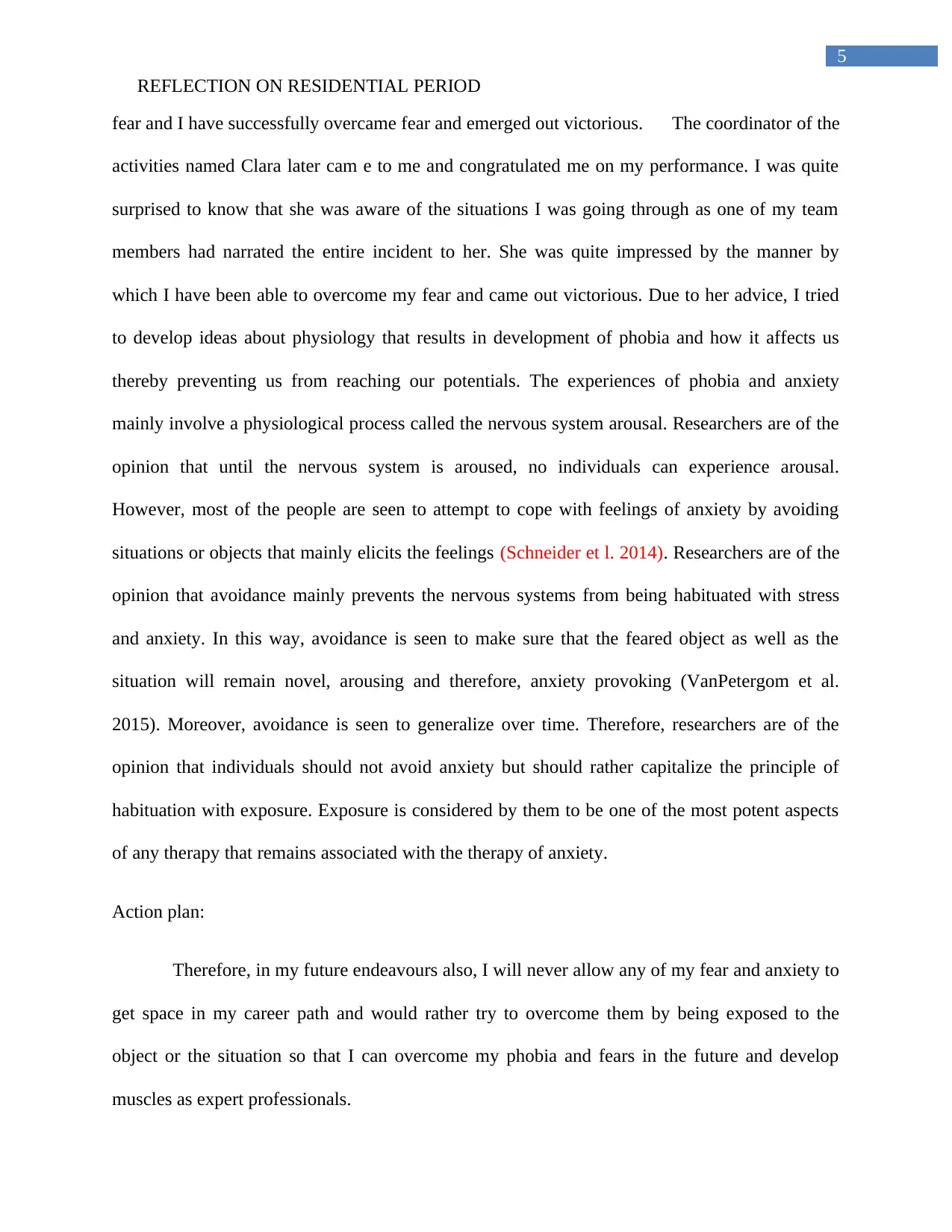
5
REFLECTION ON RESIDENTIAL PERIOD
fear and I have successfully overcame fear and emerged out victorious. The coordinator of the
activities named Clara later cam e to me and congratulated me on my performance. I was quite
surprised to know that she was aware of the situations I was going through as one of my team
members had narrated the entire incident to her. She was quite impressed by the manner by
which I have been able to overcome my fear and came out victorious. Due to her advice, I tried
to develop ideas about physiology that results in development of phobia and how it affects us
thereby preventing us from reaching our potentials. The experiences of phobia and anxiety
mainly involve a physiological process called the nervous system arousal. Researchers are of the
opinion that until the nervous system is aroused, no individuals can experience arousal.
However, most of the people are seen to attempt to cope with feelings of anxiety by avoiding
situations or objects that mainly elicits the feelings (Schneider et l. 2014). Researchers are of the
opinion that avoidance mainly prevents the nervous systems from being habituated with stress
and anxiety. In this way, avoidance is seen to make sure that the feared object as well as the
situation will remain novel, arousing and therefore, anxiety provoking (VanPetergom et al.
2015). Moreover, avoidance is seen to generalize over time. Therefore, researchers are of the
opinion that individuals should not avoid anxiety but should rather capitalize the principle of
habituation with exposure. Exposure is considered by them to be one of the most potent aspects
of any therapy that remains associated with the therapy of anxiety.
Action plan:
Therefore, in my future endeavours also, I will never allow any of my fear and anxiety to
get space in my career path and would rather try to overcome them by being exposed to the
object or the situation so that I can overcome my phobia and fears in the future and develop
muscles as expert professionals.
REFLECTION ON RESIDENTIAL PERIOD
fear and I have successfully overcame fear and emerged out victorious. The coordinator of the
activities named Clara later cam e to me and congratulated me on my performance. I was quite
surprised to know that she was aware of the situations I was going through as one of my team
members had narrated the entire incident to her. She was quite impressed by the manner by
which I have been able to overcome my fear and came out victorious. Due to her advice, I tried
to develop ideas about physiology that results in development of phobia and how it affects us
thereby preventing us from reaching our potentials. The experiences of phobia and anxiety
mainly involve a physiological process called the nervous system arousal. Researchers are of the
opinion that until the nervous system is aroused, no individuals can experience arousal.
However, most of the people are seen to attempt to cope with feelings of anxiety by avoiding
situations or objects that mainly elicits the feelings (Schneider et l. 2014). Researchers are of the
opinion that avoidance mainly prevents the nervous systems from being habituated with stress
and anxiety. In this way, avoidance is seen to make sure that the feared object as well as the
situation will remain novel, arousing and therefore, anxiety provoking (VanPetergom et al.
2015). Moreover, avoidance is seen to generalize over time. Therefore, researchers are of the
opinion that individuals should not avoid anxiety but should rather capitalize the principle of
habituation with exposure. Exposure is considered by them to be one of the most potent aspects
of any therapy that remains associated with the therapy of anxiety.
Action plan:
Therefore, in my future endeavours also, I will never allow any of my fear and anxiety to
get space in my career path and would rather try to overcome them by being exposed to the
object or the situation so that I can overcome my phobia and fears in the future and develop
muscles as expert professionals.
⊘ This is a preview!⊘
Do you want full access?
Subscribe today to unlock all pages.

Trusted by 1+ million students worldwide
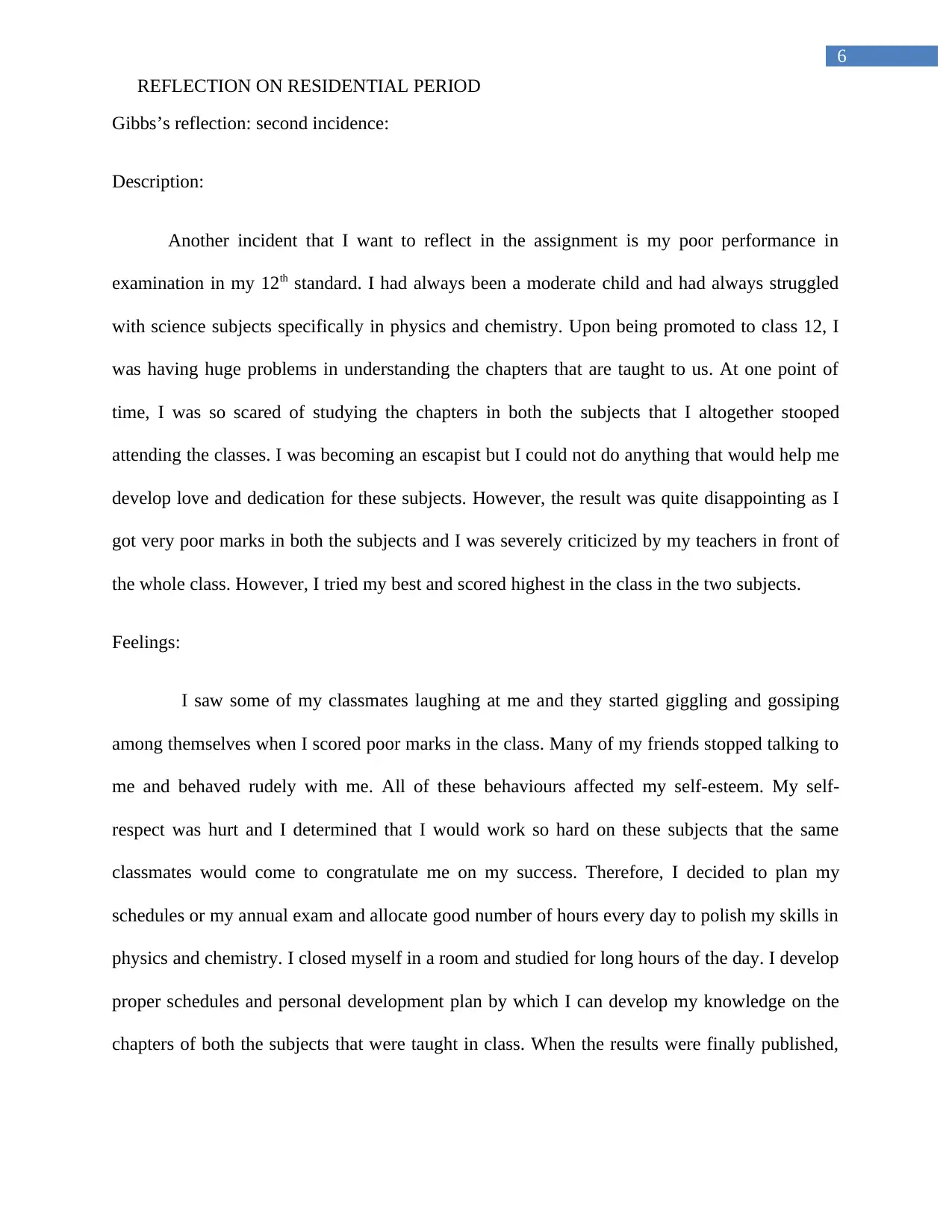
6
REFLECTION ON RESIDENTIAL PERIOD
Gibbs’s reflection: second incidence:
Description:
Another incident that I want to reflect in the assignment is my poor performance in
examination in my 12th standard. I had always been a moderate child and had always struggled
with science subjects specifically in physics and chemistry. Upon being promoted to class 12, I
was having huge problems in understanding the chapters that are taught to us. At one point of
time, I was so scared of studying the chapters in both the subjects that I altogether stooped
attending the classes. I was becoming an escapist but I could not do anything that would help me
develop love and dedication for these subjects. However, the result was quite disappointing as I
got very poor marks in both the subjects and I was severely criticized by my teachers in front of
the whole class. However, I tried my best and scored highest in the class in the two subjects.
Feelings:
I saw some of my classmates laughing at me and they started giggling and gossiping
among themselves when I scored poor marks in the class. Many of my friends stopped talking to
me and behaved rudely with me. All of these behaviours affected my self-esteem. My self-
respect was hurt and I determined that I would work so hard on these subjects that the same
classmates would come to congratulate me on my success. Therefore, I decided to plan my
schedules or my annual exam and allocate good number of hours every day to polish my skills in
physics and chemistry. I closed myself in a room and studied for long hours of the day. I develop
proper schedules and personal development plan by which I can develop my knowledge on the
chapters of both the subjects that were taught in class. When the results were finally published,
REFLECTION ON RESIDENTIAL PERIOD
Gibbs’s reflection: second incidence:
Description:
Another incident that I want to reflect in the assignment is my poor performance in
examination in my 12th standard. I had always been a moderate child and had always struggled
with science subjects specifically in physics and chemistry. Upon being promoted to class 12, I
was having huge problems in understanding the chapters that are taught to us. At one point of
time, I was so scared of studying the chapters in both the subjects that I altogether stooped
attending the classes. I was becoming an escapist but I could not do anything that would help me
develop love and dedication for these subjects. However, the result was quite disappointing as I
got very poor marks in both the subjects and I was severely criticized by my teachers in front of
the whole class. However, I tried my best and scored highest in the class in the two subjects.
Feelings:
I saw some of my classmates laughing at me and they started giggling and gossiping
among themselves when I scored poor marks in the class. Many of my friends stopped talking to
me and behaved rudely with me. All of these behaviours affected my self-esteem. My self-
respect was hurt and I determined that I would work so hard on these subjects that the same
classmates would come to congratulate me on my success. Therefore, I decided to plan my
schedules or my annual exam and allocate good number of hours every day to polish my skills in
physics and chemistry. I closed myself in a room and studied for long hours of the day. I develop
proper schedules and personal development plan by which I can develop my knowledge on the
chapters of both the subjects that were taught in class. When the results were finally published,
Paraphrase This Document
Need a fresh take? Get an instant paraphrase of this document with our AI Paraphraser
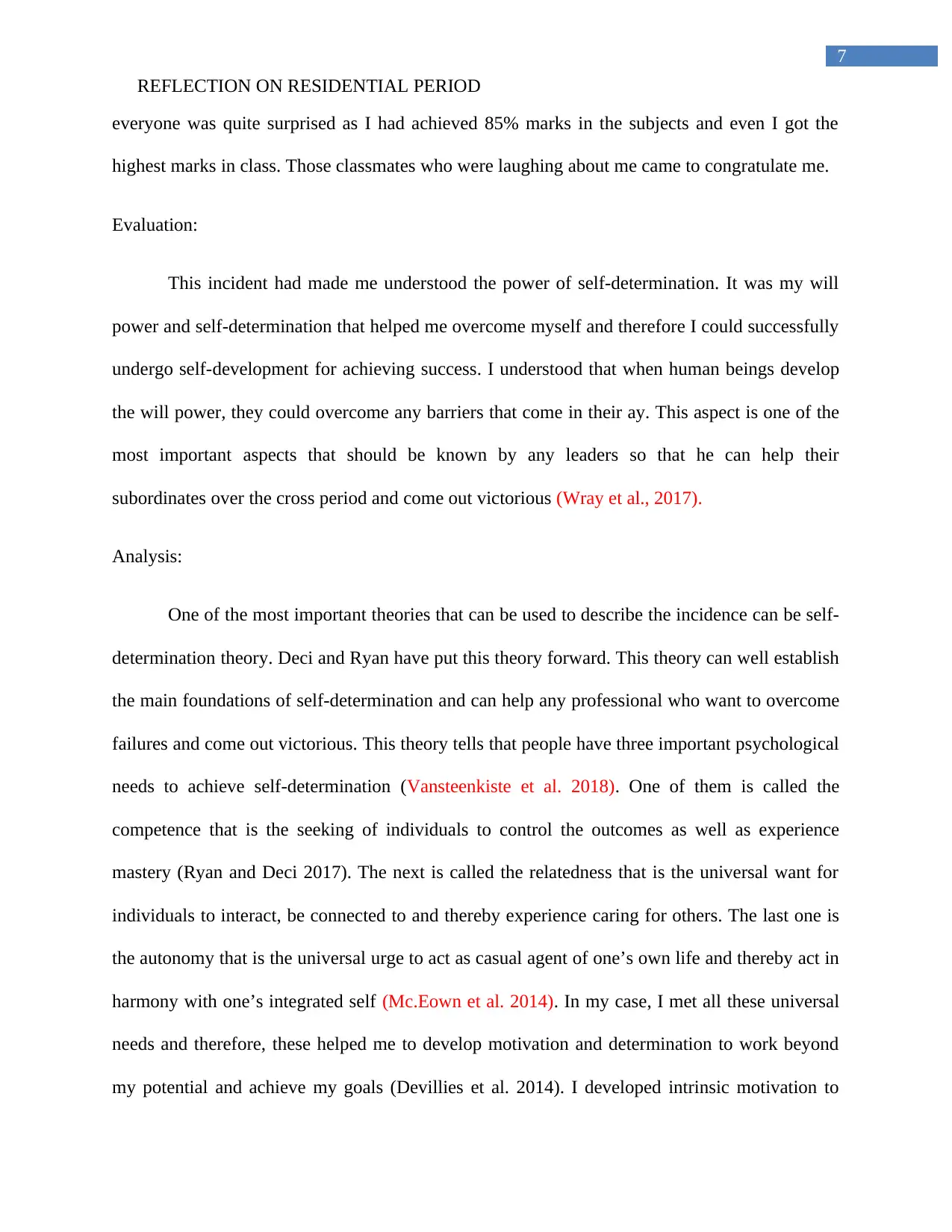
7
REFLECTION ON RESIDENTIAL PERIOD
everyone was quite surprised as I had achieved 85% marks in the subjects and even I got the
highest marks in class. Those classmates who were laughing about me came to congratulate me.
Evaluation:
This incident had made me understood the power of self-determination. It was my will
power and self-determination that helped me overcome myself and therefore I could successfully
undergo self-development for achieving success. I understood that when human beings develop
the will power, they could overcome any barriers that come in their ay. This aspect is one of the
most important aspects that should be known by any leaders so that he can help their
subordinates over the cross period and come out victorious (Wray et al., 2017).
Analysis:
One of the most important theories that can be used to describe the incidence can be self-
determination theory. Deci and Ryan have put this theory forward. This theory can well establish
the main foundations of self-determination and can help any professional who want to overcome
failures and come out victorious. This theory tells that people have three important psychological
needs to achieve self-determination (Vansteenkiste et al. 2018). One of them is called the
competence that is the seeking of individuals to control the outcomes as well as experience
mastery (Ryan and Deci 2017). The next is called the relatedness that is the universal want for
individuals to interact, be connected to and thereby experience caring for others. The last one is
the autonomy that is the universal urge to act as casual agent of one’s own life and thereby act in
harmony with one’s integrated self (Mc.Eown et al. 2014). In my case, I met all these universal
needs and therefore, these helped me to develop motivation and determination to work beyond
my potential and achieve my goals (Devillies et al. 2014). I developed intrinsic motivation to
REFLECTION ON RESIDENTIAL PERIOD
everyone was quite surprised as I had achieved 85% marks in the subjects and even I got the
highest marks in class. Those classmates who were laughing about me came to congratulate me.
Evaluation:
This incident had made me understood the power of self-determination. It was my will
power and self-determination that helped me overcome myself and therefore I could successfully
undergo self-development for achieving success. I understood that when human beings develop
the will power, they could overcome any barriers that come in their ay. This aspect is one of the
most important aspects that should be known by any leaders so that he can help their
subordinates over the cross period and come out victorious (Wray et al., 2017).
Analysis:
One of the most important theories that can be used to describe the incidence can be self-
determination theory. Deci and Ryan have put this theory forward. This theory can well establish
the main foundations of self-determination and can help any professional who want to overcome
failures and come out victorious. This theory tells that people have three important psychological
needs to achieve self-determination (Vansteenkiste et al. 2018). One of them is called the
competence that is the seeking of individuals to control the outcomes as well as experience
mastery (Ryan and Deci 2017). The next is called the relatedness that is the universal want for
individuals to interact, be connected to and thereby experience caring for others. The last one is
the autonomy that is the universal urge to act as casual agent of one’s own life and thereby act in
harmony with one’s integrated self (Mc.Eown et al. 2014). In my case, I met all these universal
needs and therefore, these helped me to develop motivation and determination to work beyond
my potential and achieve my goals (Devillies et al. 2014). I developed intrinsic motivation to
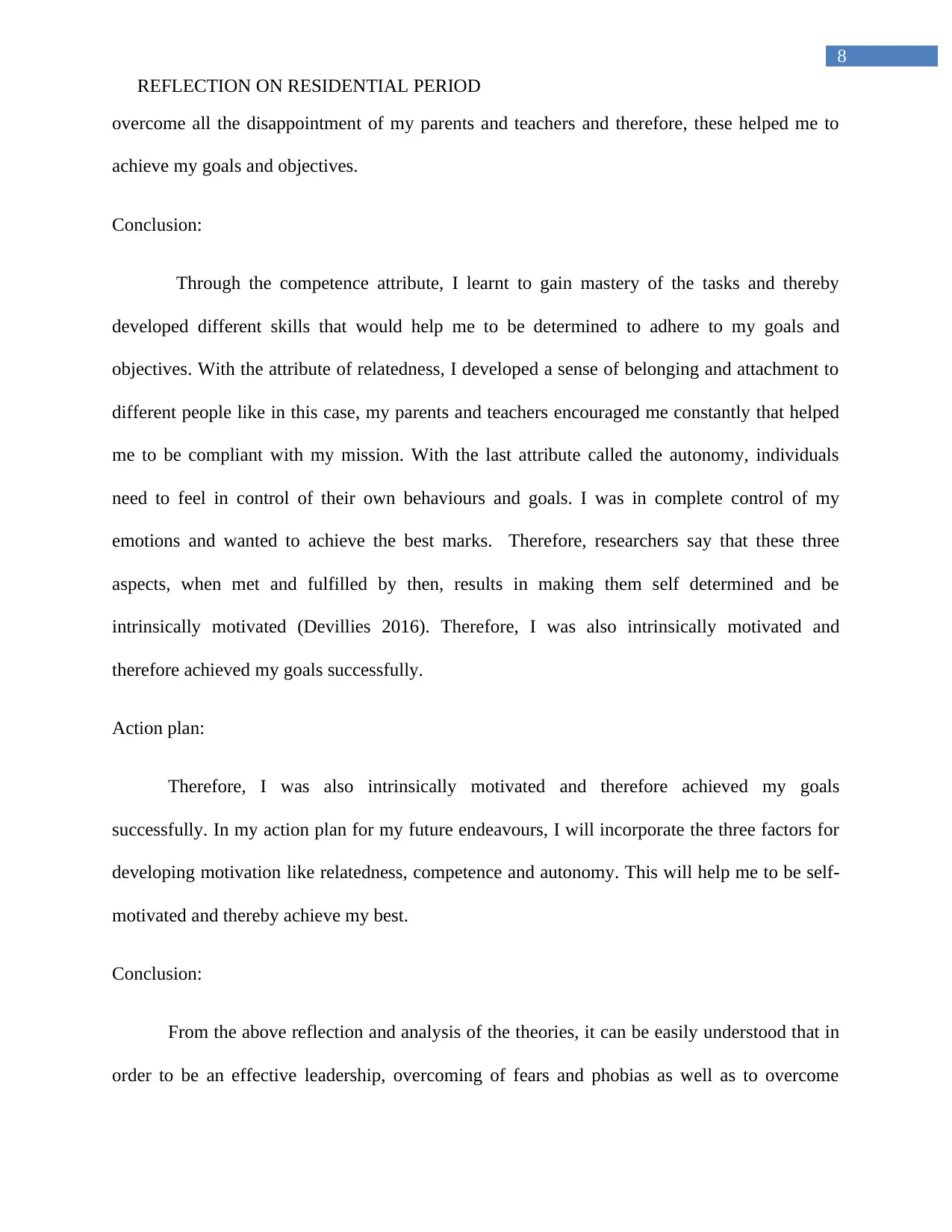
8
REFLECTION ON RESIDENTIAL PERIOD
overcome all the disappointment of my parents and teachers and therefore, these helped me to
achieve my goals and objectives.
Conclusion:
Through the competence attribute, I learnt to gain mastery of the tasks and thereby
developed different skills that would help me to be determined to adhere to my goals and
objectives. With the attribute of relatedness, I developed a sense of belonging and attachment to
different people like in this case, my parents and teachers encouraged me constantly that helped
me to be compliant with my mission. With the last attribute called the autonomy, individuals
need to feel in control of their own behaviours and goals. I was in complete control of my
emotions and wanted to achieve the best marks. Therefore, researchers say that these three
aspects, when met and fulfilled by then, results in making them self determined and be
intrinsically motivated (Devillies 2016). Therefore, I was also intrinsically motivated and
therefore achieved my goals successfully.
Action plan:
Therefore, I was also intrinsically motivated and therefore achieved my goals
successfully. In my action plan for my future endeavours, I will incorporate the three factors for
developing motivation like relatedness, competence and autonomy. This will help me to be self-
motivated and thereby achieve my best.
Conclusion:
From the above reflection and analysis of the theories, it can be easily understood that in
order to be an effective leadership, overcoming of fears and phobias as well as to overcome
REFLECTION ON RESIDENTIAL PERIOD
overcome all the disappointment of my parents and teachers and therefore, these helped me to
achieve my goals and objectives.
Conclusion:
Through the competence attribute, I learnt to gain mastery of the tasks and thereby
developed different skills that would help me to be determined to adhere to my goals and
objectives. With the attribute of relatedness, I developed a sense of belonging and attachment to
different people like in this case, my parents and teachers encouraged me constantly that helped
me to be compliant with my mission. With the last attribute called the autonomy, individuals
need to feel in control of their own behaviours and goals. I was in complete control of my
emotions and wanted to achieve the best marks. Therefore, researchers say that these three
aspects, when met and fulfilled by then, results in making them self determined and be
intrinsically motivated (Devillies 2016). Therefore, I was also intrinsically motivated and
therefore achieved my goals successfully.
Action plan:
Therefore, I was also intrinsically motivated and therefore achieved my goals
successfully. In my action plan for my future endeavours, I will incorporate the three factors for
developing motivation like relatedness, competence and autonomy. This will help me to be self-
motivated and thereby achieve my best.
Conclusion:
From the above reflection and analysis of the theories, it can be easily understood that in
order to be an effective leadership, overcoming of fears and phobias as well as to overcome
⊘ This is a preview!⊘
Do you want full access?
Subscribe today to unlock all pages.

Trusted by 1+ million students worldwide
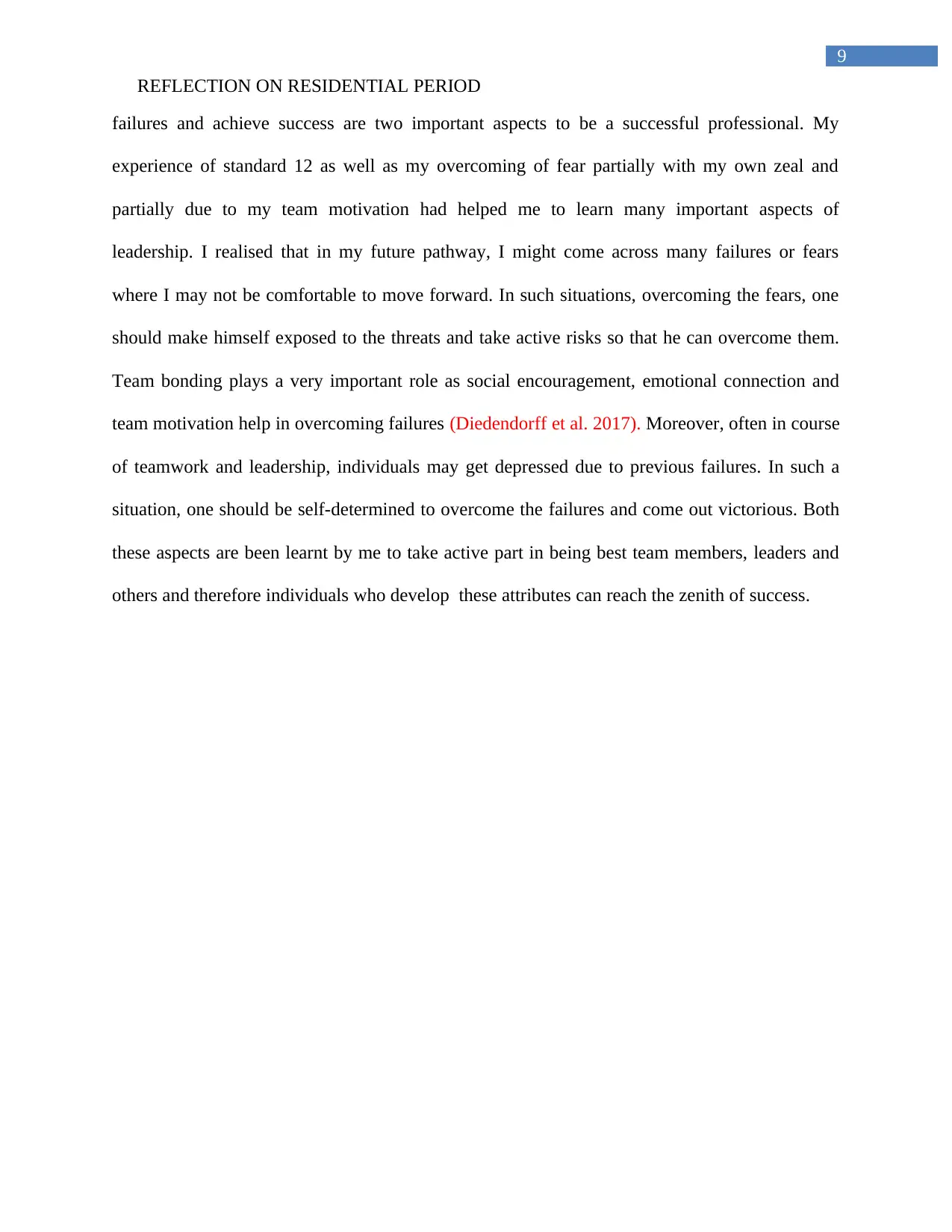
9
REFLECTION ON RESIDENTIAL PERIOD
failures and achieve success are two important aspects to be a successful professional. My
experience of standard 12 as well as my overcoming of fear partially with my own zeal and
partially due to my team motivation had helped me to learn many important aspects of
leadership. I realised that in my future pathway, I might come across many failures or fears
where I may not be comfortable to move forward. In such situations, overcoming the fears, one
should make himself exposed to the threats and take active risks so that he can overcome them.
Team bonding plays a very important role as social encouragement, emotional connection and
team motivation help in overcoming failures (Diedendorff et al. 2017). Moreover, often in course
of teamwork and leadership, individuals may get depressed due to previous failures. In such a
situation, one should be self-determined to overcome the failures and come out victorious. Both
these aspects are been learnt by me to take active part in being best team members, leaders and
others and therefore individuals who develop these attributes can reach the zenith of success.
REFLECTION ON RESIDENTIAL PERIOD
failures and achieve success are two important aspects to be a successful professional. My
experience of standard 12 as well as my overcoming of fear partially with my own zeal and
partially due to my team motivation had helped me to learn many important aspects of
leadership. I realised that in my future pathway, I might come across many failures or fears
where I may not be comfortable to move forward. In such situations, overcoming the fears, one
should make himself exposed to the threats and take active risks so that he can overcome them.
Team bonding plays a very important role as social encouragement, emotional connection and
team motivation help in overcoming failures (Diedendorff et al. 2017). Moreover, often in course
of teamwork and leadership, individuals may get depressed due to previous failures. In such a
situation, one should be self-determined to overcome the failures and come out victorious. Both
these aspects are been learnt by me to take active part in being best team members, leaders and
others and therefore individuals who develop these attributes can reach the zenith of success.
Paraphrase This Document
Need a fresh take? Get an instant paraphrase of this document with our AI Paraphraser
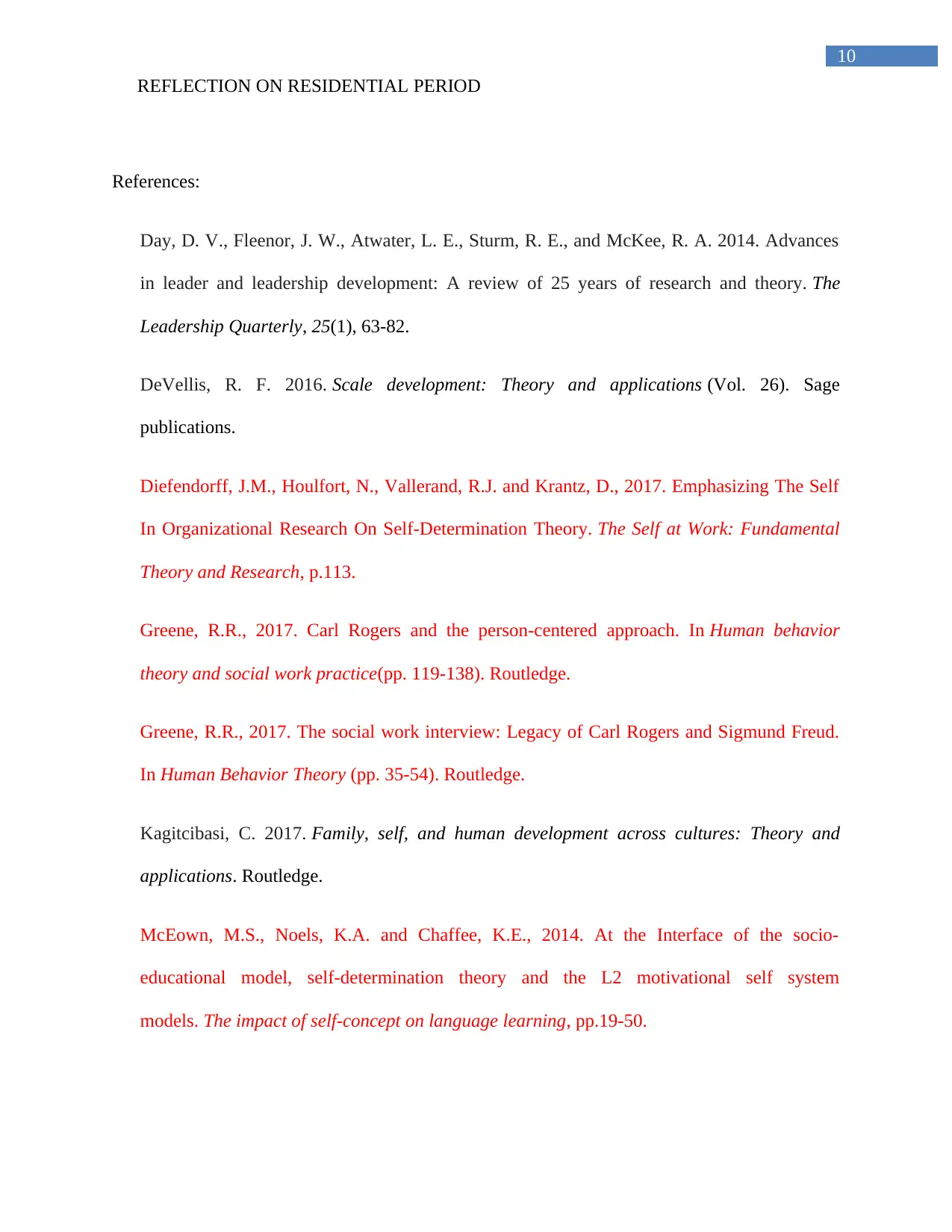
10
REFLECTION ON RESIDENTIAL PERIOD
References:
Day, D. V., Fleenor, J. W., Atwater, L. E., Sturm, R. E., and McKee, R. A. 2014. Advances
in leader and leadership development: A review of 25 years of research and theory. The
Leadership Quarterly, 25(1), 63-82.
DeVellis, R. F. 2016. Scale development: Theory and applications (Vol. 26). Sage
publications.
Diefendorff, J.M., Houlfort, N., Vallerand, R.J. and Krantz, D., 2017. Emphasizing The Self
In Organizational Research On Self-Determination Theory. The Self at Work: Fundamental
Theory and Research, p.113.
Greene, R.R., 2017. Carl Rogers and the person-centered approach. In Human behavior
theory and social work practice(pp. 119-138). Routledge.
Greene, R.R., 2017. The social work interview: Legacy of Carl Rogers and Sigmund Freud.
In Human Behavior Theory (pp. 35-54). Routledge.
Kagitcibasi, C. 2017. Family, self, and human development across cultures: Theory and
applications. Routledge.
McEown, M.S., Noels, K.A. and Chaffee, K.E., 2014. At the Interface of the socio-
educational model, self-determination theory and the L2 motivational self system
models. The impact of self-concept on language learning, pp.19-50.
REFLECTION ON RESIDENTIAL PERIOD
References:
Day, D. V., Fleenor, J. W., Atwater, L. E., Sturm, R. E., and McKee, R. A. 2014. Advances
in leader and leadership development: A review of 25 years of research and theory. The
Leadership Quarterly, 25(1), 63-82.
DeVellis, R. F. 2016. Scale development: Theory and applications (Vol. 26). Sage
publications.
Diefendorff, J.M., Houlfort, N., Vallerand, R.J. and Krantz, D., 2017. Emphasizing The Self
In Organizational Research On Self-Determination Theory. The Self at Work: Fundamental
Theory and Research, p.113.
Greene, R.R., 2017. Carl Rogers and the person-centered approach. In Human behavior
theory and social work practice(pp. 119-138). Routledge.
Greene, R.R., 2017. The social work interview: Legacy of Carl Rogers and Sigmund Freud.
In Human Behavior Theory (pp. 35-54). Routledge.
Kagitcibasi, C. 2017. Family, self, and human development across cultures: Theory and
applications. Routledge.
McEown, M.S., Noels, K.A. and Chaffee, K.E., 2014. At the Interface of the socio-
educational model, self-determination theory and the L2 motivational self system
models. The impact of self-concept on language learning, pp.19-50.
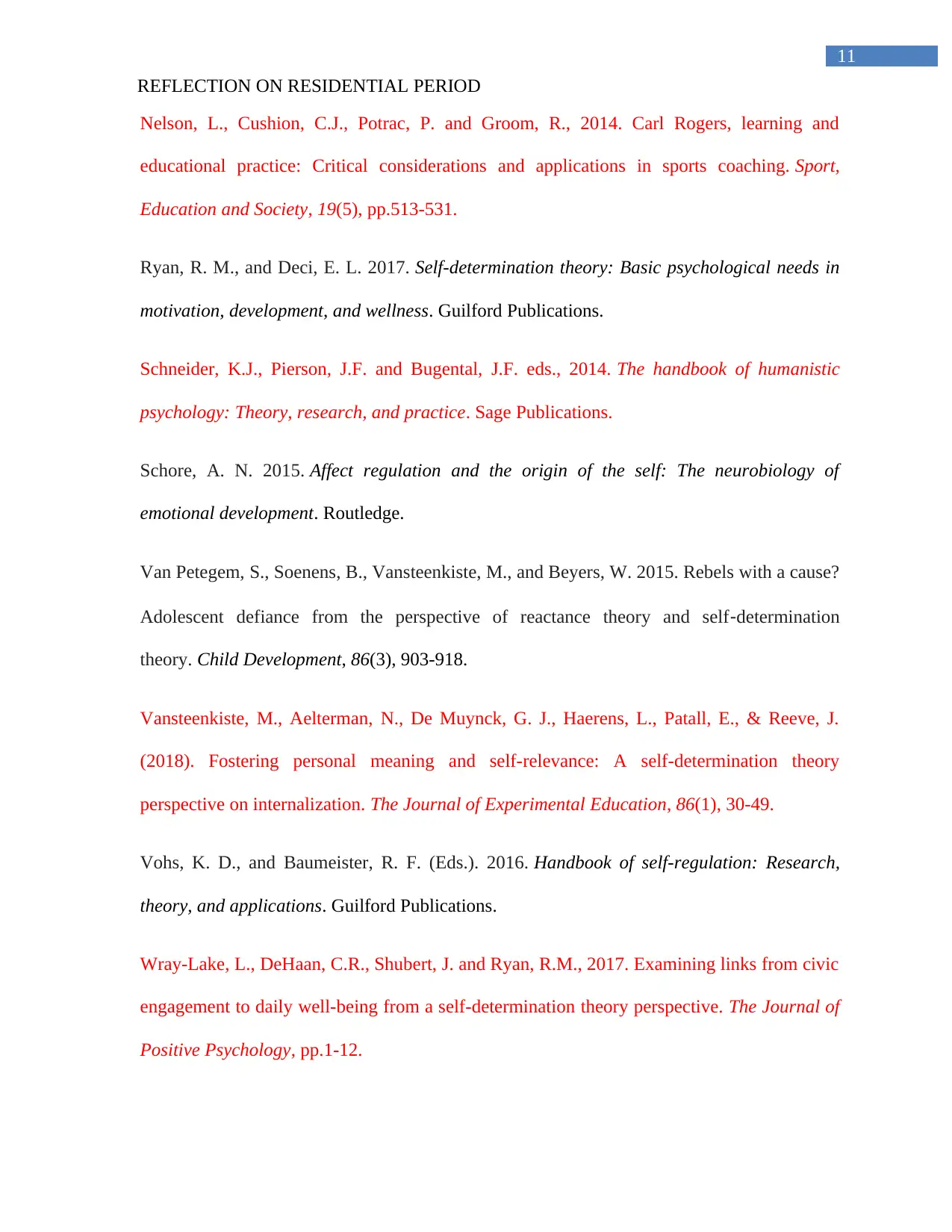
11
REFLECTION ON RESIDENTIAL PERIOD
Nelson, L., Cushion, C.J., Potrac, P. and Groom, R., 2014. Carl Rogers, learning and
educational practice: Critical considerations and applications in sports coaching. Sport,
Education and Society, 19(5), pp.513-531.
Ryan, R. M., and Deci, E. L. 2017. Self-determination theory: Basic psychological needs in
motivation, development, and wellness. Guilford Publications.
Schneider, K.J., Pierson, J.F. and Bugental, J.F. eds., 2014. The handbook of humanistic
psychology: Theory, research, and practice. Sage Publications.
Schore, A. N. 2015. Affect regulation and the origin of the self: The neurobiology of
emotional development. Routledge.
Van Petegem, S., Soenens, B., Vansteenkiste, M., and Beyers, W. 2015. Rebels with a cause?
Adolescent defiance from the perspective of reactance theory and self‐determination
theory. Child Development, 86(3), 903-918.
Vansteenkiste, M., Aelterman, N., De Muynck, G. J., Haerens, L., Patall, E., & Reeve, J.
(2018). Fostering personal meaning and self-relevance: A self-determination theory
perspective on internalization. The Journal of Experimental Education, 86(1), 30-49.
Vohs, K. D., and Baumeister, R. F. (Eds.). 2016. Handbook of self-regulation: Research,
theory, and applications. Guilford Publications.
Wray-Lake, L., DeHaan, C.R., Shubert, J. and Ryan, R.M., 2017. Examining links from civic
engagement to daily well-being from a self-determination theory perspective. The Journal of
Positive Psychology, pp.1-12.
REFLECTION ON RESIDENTIAL PERIOD
Nelson, L., Cushion, C.J., Potrac, P. and Groom, R., 2014. Carl Rogers, learning and
educational practice: Critical considerations and applications in sports coaching. Sport,
Education and Society, 19(5), pp.513-531.
Ryan, R. M., and Deci, E. L. 2017. Self-determination theory: Basic psychological needs in
motivation, development, and wellness. Guilford Publications.
Schneider, K.J., Pierson, J.F. and Bugental, J.F. eds., 2014. The handbook of humanistic
psychology: Theory, research, and practice. Sage Publications.
Schore, A. N. 2015. Affect regulation and the origin of the self: The neurobiology of
emotional development. Routledge.
Van Petegem, S., Soenens, B., Vansteenkiste, M., and Beyers, W. 2015. Rebels with a cause?
Adolescent defiance from the perspective of reactance theory and self‐determination
theory. Child Development, 86(3), 903-918.
Vansteenkiste, M., Aelterman, N., De Muynck, G. J., Haerens, L., Patall, E., & Reeve, J.
(2018). Fostering personal meaning and self-relevance: A self-determination theory
perspective on internalization. The Journal of Experimental Education, 86(1), 30-49.
Vohs, K. D., and Baumeister, R. F. (Eds.). 2016. Handbook of self-regulation: Research,
theory, and applications. Guilford Publications.
Wray-Lake, L., DeHaan, C.R., Shubert, J. and Ryan, R.M., 2017. Examining links from civic
engagement to daily well-being from a self-determination theory perspective. The Journal of
Positive Psychology, pp.1-12.
⊘ This is a preview!⊘
Do you want full access?
Subscribe today to unlock all pages.

Trusted by 1+ million students worldwide
1 out of 13
Related Documents
Your All-in-One AI-Powered Toolkit for Academic Success.
+13062052269
info@desklib.com
Available 24*7 on WhatsApp / Email
![[object Object]](/_next/static/media/star-bottom.7253800d.svg)
Unlock your academic potential
Copyright © 2020–2026 A2Z Services. All Rights Reserved. Developed and managed by ZUCOL.





